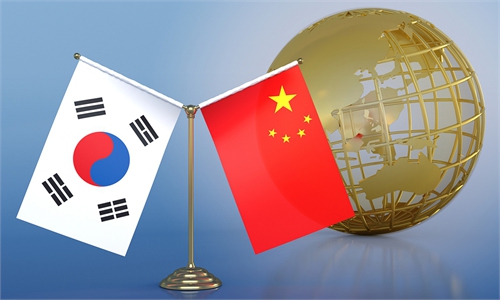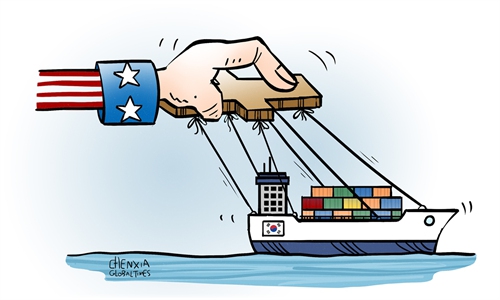
Illustration: Liu Xiangya/Global Times
Although the US may loosen restrictions on South Korean chipmakers which want to maintain or expand their operations in China, it will be not enough to allow some breathing space for South Korea's semiconductor industry. The sharp deterioration in South Korea's chip exports reminds the country of the need to take serious action to protect their own interests from Washington's chip war, and, more importantly, to strengthen industry chain cooperation with China.Data from the Ministry of Trade, Industry and Energy showed on Wednesday that South Korea's export of information and communications technology (ICT) products dropped for the 11th successive month in May. Semiconductor export plunged 35.7 percent to $7.47 billion last month on the back of lower chip prices. Notably, South Korea's exports of its most lucrative memory chip fell by 53.1 percent, according to media reports.
The chip sector accounts for roughly 20 percent of exports for South Korea, and in recent years has been a bright spot in a languid economy. As South Korea is heavily reliant on China for its semiconductor exports, at a time when the US' ill-intentioned chip war against China is escalating, South Korea should avoid becoming a follower of US policy, otherwise, it will be the biggest victim of the US' efforts to prevent China buying or developing advanced chips.
A big decline in memory chip exports has sounded the alarm to a situation that South Korea's chipmakers are paying for Seoul's compromise amid the US-initiated tech "decoupling" from China. In this process, South Korea's chip competitiveness is being damaged.
In a world of increasing competition, South Korea should seek to maintain its competitiveness in the semiconductor industry at all costs, which means the country needs to be more resolute in fighting for its own interests with the US. The Wall Street Journal (WSJ) reported on Monday that the Biden administration plans to allow top semiconductor manufacturers from South Korea to maintain and expand their existing chip-making operation in China without US reprisals. It would be good news if true, but loosening restrictions are not enough. When Washington's ill-intentioned chip war harms the interests of South Korean chipmakers, they need more helps.
In the face of US pressure and economic coercion, protecting the legitimate rights and interests of South Korean companies should become the first priority of Seoul. South Korea's compromise has revealed how closely it is aligned with the US, especially in terms of politics and security, but this should not come at the expense of South Korea's chip competitiveness. It is unwise and pathetic for Seoul to totally succumb to Washington's semiconductor coercion.
China is a big market for South Korea semiconductor firms Samsung Electronics Co and SK Hynix Inc and home to some of their factories. China accounts for 40 percent of Samsung's total flash memory chips (NAND) production capability, CNBC reported. It also accounts for 40-50 percent of SK Hynix's dynamic random-access memory (DRAM) chips. It's important to maintain the stability of the industrial supply chain between the two countries and strengthen cooperation across bilateral and multilateral fields.
Meeting on the sidelines of the 2023 APEC Ministers Responsible for Trade Meeting on May 26, Chinese Commerce Minister Wang Wentao and South Korea's Trade Minister Ahn Duk-geun vowed to intensify cooperation. Wang said China is ready to work with South Korea to deepen bilateral trade and investment cooperation, maintain the stability of the industrial chain and supply chain, and jointly push bilateral, regional and multilateral economic and trade cooperation to a new level, according to the Xinhua News Agency.
It is clear that US restriction goes against South Korea's own economic interests, and South Korea should put more efforts into strengthening dialogue and cooperation with China on semiconductor industry supply chains. Hopefully South Korea can meet China halfway, effectively protect South Korean chipmakers' interests and help maintain bilateral and regional supply chain stability, creating a favorable atmosphere for bilateral cooperation in the semiconductor industry.
The author is a reporter with the Global Times. bizopinion@globaltimes.com.cn



